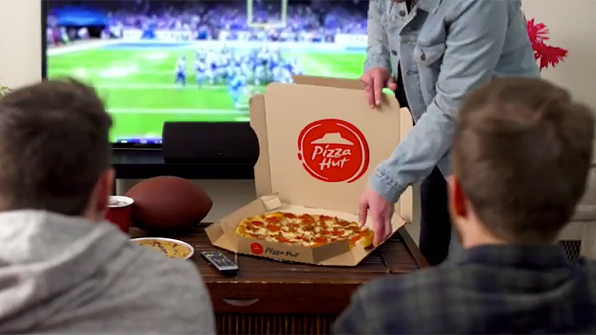It’s more of a social study than a scientific one, at least in some respects. But the researchers at New York University who carried out the analysis insist it’s scientifically accurate. I just wonder how far we, as a society, can go placing the blame for phenomena like obesity on third parties?
 Sunday afternoon dads: Setting a bad example for their kids?
Sunday afternoon dads: Setting a bad example for their kids?
A new study by researchers at the New York University School of Medicine (NYU) lays a big portion of the blame on pro sports broadcasts for promoting childhood obesity. The pervasive negative effects of watching broadcasts of sporting events sponsored by ‘unhealthy’ foods seems to be a scientific fact. But the study doesn’t take into account the countervailing effects of positive parental guidance and example.
The study…
Researchers analized Nielsen TV ratings statistics of televised sports programs among children 2-17 years of age. Initial findings showed that food and beverage commercials were second only to automotive sales in frequency of appearance.
Further study looked at the specific products advertised in the food and beverage commercials and found the overwhelming majority to be ‘non-nutritions’ ones, such as Potato Chips and Sugary Cereals. The nutrition value of the various foods was determined using a 0-100 point scale called the Nutrient Profile Index (NPI). An NPI of 64 or higher indicates a food product as ‘nutritious’. The average NPI score of foods advertised on major sports broadcasts was just 38-39. In fact three quarters of the food and beverage ads studied failed to meet the minimum score required to qualify as nutritious.
The extrapolation…
The NFL was branded the biggest offender among leading sports organizations, clocking the highest number of television impressions from its ads among viewers aged 2-17 (more than 224 million) and total YouTube views (more than 93 million) – a substantial lead on its closest challenger.
Researchers also looked at the distribution of food and beverage sponsorships among major sports organizations. Again, the NFL led the pack with 10, followed by the NHL with 7.
But are the conclusions valid?
On the surface, and in strictly statistical terms, the study seems an eye-opener.
But there’s nothing illegal about advertising your product where you think the most likely purchasers will be watching. And it’s unlikely politicians will legislate what major league sports can and cannot advertise. Big Sports is just too powerful an economic and social force to risk poking in the eye.
So, the researchers are suggesting the sports organizations voluntarily limit their food and beverage sponsorships, for the good of our children.
“Sports organizations need to develop more health-conscious marketing strategies that are aligned with recommendations from national medical associations,” says Marie Bragg, PhD, assistant professor of Population Health at NYU School of Medicine and the study’s Lead Investigator.
But that’s unlikely. The health of our children is well down the list of priorities for Big Sports, way back of winning, making big bucks and garnering mega TV audiences.
Parents need to take responsibility
The young parents of today are now and will be increasingly Millennials. Post-Boomers, anyway. This generation has grown up expecting to have everything handed to them, and to believe that whatever they want and like is right, and that they are incapable of doing anything wrong. They want all the enjoyment and advantages modern life can provide without shouldering any of the responsibility. Let the schools and the TV educate their kids, they say, and to Hell with parental supervision and setting a good example. Some young adults these days even maintain that too much guidance and influence over their kids infringes the little ones’ right to make their own choices and seek their own paths.
Nonsense.
In an environment like this, it is difficult to see any outside influence in a kid’s life having the necessary countervailing effect on TV advertising and the shrewd advertising strategies of Big Food and Bev.
Schools in some jurisdiction s have attempted to sway kids’; eating habits with mandatory school lunch programs, but they have largely failed. On the up side, there, recent advances in menu planning, seasonings and other aspects of school lunch program delivery show promise in getting kids to ‘eat their veggies’.
But the main responsibility for ensuring kids eat right and adopt healthy attitudes and habits toward food still rests – as it always has – with the parents.
~ Maggie J.

